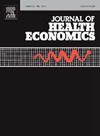注意过程在时间权衡和标准赌博任务中潜在的健康状态评估
IF 3.6
2区 经济学
Q1 ECONOMICS
引用次数: 0
摘要
时间权衡(TTO)和标准赌博(SG)任务是衡量健康状态(如糖尿病、坐在轮椅上)效用的常用方法。然而,重要的是,对于给定的运行状况,这两种方法通常会产生不同的实用程序。在这里,我们通过分析个体在评估TTO和SG任务中的健康状态时的注意模式来研究这种效用差距背后的认知过程。在一项在线实验中,每个受访者都完成了TTO和SG任务,我们使用过程跟踪方法Mouselab记录了受访者对任务属性的注意力分配:健康状态及其持续时间(TTO和SG)和概率(仅SG)。在TTO任务中,注意力在健康状态和持续时间属性之间大致平衡,而在SG任务中,注意力集中在概率和健康状态属性上。那些更关注特定于任务的权衡属性(即分别在TTO和SG中持续时间和概率)的个体似乎不太愿意做出这些权衡,导致健康状态的效用更高。值得注意的是,效用差距与注意分配的个体差异有关:对任务特定权衡调整注意力分配较少的受访者在TTO和SG任务之间产生了更多的差异效用。我们的发现强调了注意过程在偏好构建中的关键作用,强调了人们分配给健康状态的效用的差异可能会受到注意分配改变的潜在影响。本文章由计算机程序翻译,如有差异,请以英文原文为准。
Attentional processes underlying health state valuation with time trade-off and standard gamble tasks
Time Trade-Off (TTO) and Standard Gamble (SG) tasks are commonly used methods to measure utilities for health states (e.g., diabetes, being in a wheelchair). Importantly, however, the two methods have been shown to typically yield discrepant utilities for a given health state. Here we examine the cognitive processes underlying this utility gap by analyzing individuals’ attentional patterns when evaluating health states in the TTO and SG tasks. In an online experiment, each respondent completed both a TTO and an SG task and we used the process-tracing methodology Mouselab to record respondents’ attention allocation to the tasks’ attributes: health states and their durations (in both TTO and SG), and probabilities (in SG only). In the TTO task, attention was approximately balanced between the health state and duration attributes, whereas in the SG task, attention was focussed on the probability and the health state attributes. Individuals who paid more attention to the task-specific trade-off attribute (i.e., duration and probability in TTO and SG, respectively) seemed to be less willing to make those trade-offs, leading to higher utilities for the health states. Notably, the utility gap was associated with individual differences in attention allocation: respondents who adjusted their attention allocation less to the task-specific trade-offs produced more discrepant utilities between the TTO and SG tasks. Our findings underscore the key role of attentional processes in preference construction, highlighting that differences in the utilities people assign to health states could potentially be influenced by altering attention allocation.
求助全文
通过发布文献求助,成功后即可免费获取论文全文。
去求助
来源期刊

Journal of Health Economics
医学-卫生保健
CiteScore
6.10
自引率
2.90%
发文量
96
审稿时长
49 days
期刊介绍:
This journal seeks articles related to the economics of health and medical care. Its scope will include the following topics:
Production and supply of health services;
Demand and utilization of health services;
Financing of health services;
Determinants of health, including investments in health and risky health behaviors;
Economic consequences of ill-health;
Behavioral models of demanders, suppliers and other health care agencies;
Evaluation of policy interventions that yield economic insights;
Efficiency and distributional aspects of health policy;
and such other topics as the Editors may deem appropriate.
 求助内容:
求助内容: 应助结果提醒方式:
应助结果提醒方式:


